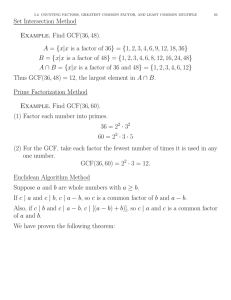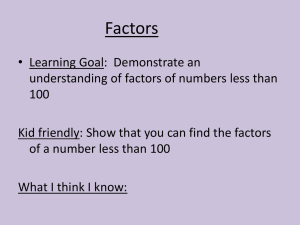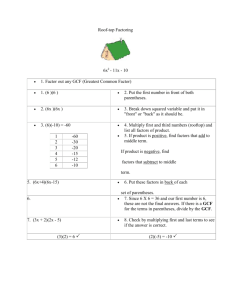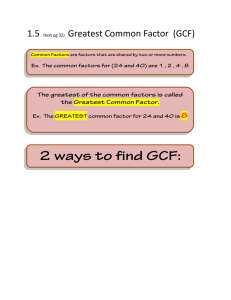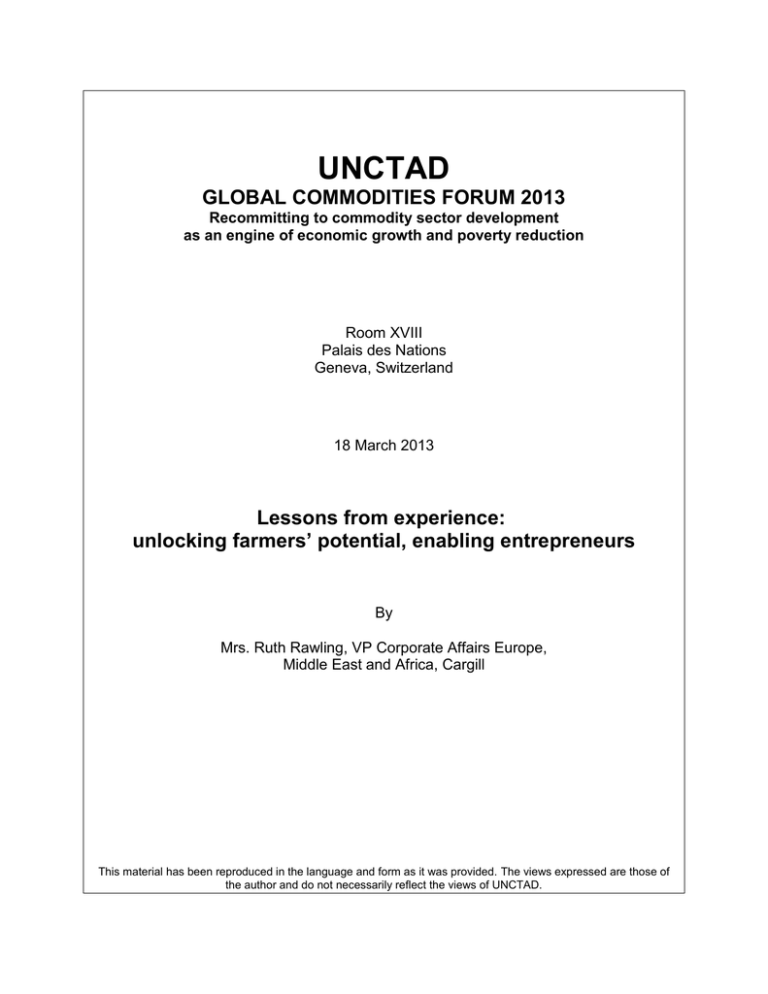
UNCTAD
GLOBAL COMMODITIES FORUM 2013
Recommitting to commodity sector development
as an engine of economic growth and poverty reduction
Room XVIII
Palais des Nations
Geneva, Switzerland
18 March 2013
Lessons from experience:
unlocking farmers’ potential, enabling entrepreneurs
By
Mrs. Ruth Rawling, VP Corporate Affairs Europe,
Middle East and Africa, Cargill
This material has been reproduced in the language and form as it was provided. The views expressed are those of
the author and do not necessarily reflect the views of UNCTAD.
Lessons from experience: unlocking
farmers’ potential, enabling entrepreneurs
Ruth Rawling
VP Corporate Affairs Europe, Middle East and Africa
UNCTAD Global Commodities Forum 18 March 2013
(© Copyright Cargill, Incorporated 2009. All rights reserved.)
0
2013 Global Commodities Forum (GCF)
Agenda
•
A word about Cargill
•
The role of the private sector
•
Palm oil smallholders – Indonesia
•
Cocoa smallholders – Cote d’Ivoire
•
Cotton farmers – Zambia
•
Grain production – Eastern Europe
•
Conclusions: the critical role of the policy framework
© Copyright Cargill, Incorporated 2009. All rights reserved.
1
2013 Global Commodities Forum (GCF)
Cargill our company
Located in 65 countries
142,000 employees worldwide
$134 billion in revenue 2011/12
$1.1 billion in profit 2011/12
2
2013 Global Commodities Forum (GCF)
Cargill is composed of 70 businesses organised
around four major segments
Agricultural
We buy, process and distribute grain, oilseeds and other
commodities to makers of food and animal nutrition products. We
also provide crop and livestock producers with products and
services.
Food
We provide food and beverage manufacturers, foodservice
companies and retailers with high-quality ingredients, meat and
poultry products, and health-promoting ingredients and ingredient
systems.
Financial
We provide our agricultural, food, financial and energy customers
around the world with risk management and financial solutions.
Industrial
We serve industrial users of energy, salt, starch and steel
products. We also develop and market sustainable products
made from agricultural feedstocks.
3
2013 Global Commodities Forum (GCF)
The role of the private sector
• The private sector is the delivery mechanism to end hunger and
poverty
• That private sector includes 450 million smallholder farmers and
millions of entrepreneurs along the food chain
• The private sector can only do this with help: help from the right policy
framework and the right incentives.
• The private sector isn’t perfect and will not deliver on every societal
goal without help from other stakeholders – and there will be a need to
fill in the gaps.
• Policy framework is critical
• And it is not simple: many different policy areas interact : markets and
trade, investment policy, property rights, infrastructure – physical,
educational - price risk management, safety nets…..
© Copyright Cargill, Incorporated 2009. All rights reserved.
4
2013 Global Commodities Forum (GCF)
Palm oil
© Copyright Cargill, Incorporated 2009. All rights reserved.
5
2013 Global Commodities Forum (GCF)
PT Hindoli – South Sumatra, Indonesia
• Transmigrants from Java Island moved to South
Sumatra in late 1980s. Became Hindoli smallholders
under PIR-Trans scheme. Oil palm planting occurred
between 1991 and 2000.
• 8,800 smallholders represented by 17 cooperatives
hold 18,000 ha.
• PT Hindoli Cargill-owned estate of 18,000 ha received
Roundtable of Sustainable Palm Oil (RSPO) certification
in 2009
• PT Hindoli smallholders 18,000 ha received RSPO
certification in August 2010:
6
o
World’s first smallholder scheme certified
under RSPO’s Smallholder Principles & Criteria
o
Joint effort and achievement of Cargill with
smallholders
2013 Global Commodities Forum (GCF)
Sustainable palm oil means sustainable business
• A smallholder kavling (plot) is their family business.
• Yield intensification is a precursor to smallholder economic well-being.
• Sustainability represents longevity and ability to pass the business on to the
next generation.
• Plantation companies and smallholders are both equally responsible for the
success of the partnership.
7
2013 Global Commodities Forum (GCF)
PT Hindoli Smallholders
•
•
Average income per farmer 2006: IDR 26,500,000 (about US$ 2,650)
In 6 years, their income has gone up by 3 times – to over $9,000 .
Aspects of the policy framework
•
Government taxes palm oil – sales tax and export tax – a burden but not punitive – and it cannot
become too uncompetitive vis a vis Malaysia. Exports – especially of refined products – are
encouraged.
•
There have been joint efforts - government/companies - at local level to put the physical
(roads/bridges) and educational infrastructure in place
•
We hold the plantation on a long lease – 30 years- and there are government requirements about
allocation of land to smallholders. Smallholders each hold 2ha land outright.
•
Industry/government discussions ensure smallholders are paid a fair price but it is linked to the world
price.
•
Government encourages sustainability certification
Original smallholder house
8
2013 Global Commodities Forum (GCF)
Smallholder house Today
Cocoa….
9
2013 Global Commodities Forum (GCF)
Working globally to improve cocoa livelihoods
10
2013 Global Commodities Forum (GCF)
The Cargill Cocoa Promise
11
2013 Global Commodities Forum (GCF)
Farmer Training Pillar
Educated farmers
1. Running programs to increase
productivity and yield
2. Expanding capacity in farmer
organizations
3. Raising standards through
certification
12
2013 Global Commodities Forum (GCF)
Farmer Training Promise Delivery
•
Farmer Field Schools:
• Twice a month 20 to 30 farmers
• Trained by Anader on GAP, post harvest
practices, social and environmental issues
• Better income through better yield & quality
• Unique platform for other projects.
•
13
Certification scheme:
• Support cooperatives to reach certification
(UTZ and RainForest),
• More efficient and transparent organizations,
access to premium.
2013 Global Commodities Forum (GCF)
Community Support Pillar
Strengthen communities
1. Working to promote and protect
the rights of children
2. Providing good quality and
relevant education
3. Increasing access to health, safety
and well being services for families
14
2013 Global Commodities Forum (GCF)
Community Support Promise Delivery
15
•
Care project:
• Build one infrastructure to increase access to
education in one community of each of our
partner co-operatives
• First wave of $725,000 ready to be
launched (14 co-operatives.)
•
-ICI project:
• Develop module and train Anader on child
protection to deliver it to 60,000 farmers
• Project approved.
• Orphanage:
• Building of an orphanage in Soubre in
partnership with Arla Foods.
•
Co-ops taking over:
• Co-operatives are using their certification
premium to launch their own social projects.
2013 Global Commodities Forum (GCF)
Farm Development Pillar
Enhanced farming
1. Regenerating farmland through
access to innovative technology
2. Enhancing biodiversity and
conservation in local
environments
3. Enabling improved infrastructure
and financing
16
2013 Global Commodities Forum (GCF)
Farmer Development Promise Delivery
•
17
Nurseries project:
• 6,000 plants in 11/12, 1 million in 12/13
• In process of defining a project to reach 20
million plants a year with GIZ and CNRA.
•
Yiri+:
• Partnership with Syngenta
• Give access to quality insecticides and
fungicides to farmers with training
• Provide tools to help to manage
phytosanitary products and certification.
•
Grafting project -> CDC:
• Using the model of Mars of CDC / CVC
within one of our cooperatives,
• In launching phase.
2013 Global Commodities Forum (GCF)
Foundation: Farmer Organizations
Professional and profitable
partners
1. Offer training and management
support
2. Train farmers on the role
as members
3. Provide equipment and financing
•
18
Co-operatives Academy:
• Project to launch a “MBA” for co-operative
managers with Technoserve,
• In thinking process.
2013 Global Commodities Forum (GCF)
70% coop sourced beans by 2015
Results – Cote d’Ivoire
19
•
•
Reaching 60,000 farmers through 1,200 farmer field schools,
87 partner co-operatives certified, 23 in process of being so
• Training budget 12/13: $3.2 million
•
•
45,000 tonnes certified bought in 11/12
80,000 tonnes certified bought in 12/13 YTD.
• Premium to co-operatives: $7 million 11/12, $15 million 12/13
•
Enabling framework: ………….
2013 Global Commodities Forum (GCF)
Historic Look: Farm gate price in origin countries
(November 2006)
EUR/Mt
€1,200
€1,000
€800
€600
€400
€200
€0
Côte d’Ivoire
Ghana
Cameroon
20
2013 Global Commodities Forum (GCF)
Nigeria
Brazil
Indonesia
Historic Look: Beans from farmer to Terminal market
(November 2006)
€1,400
44
€1,000
446
Terminal
market
59
52
36
217
107
188
145
Ocean freight and handling
144
Taxes
Usinage and FOB costs
214
€600
114
857
809
Costs from farm to exporter
warehouse
Farmer price
464
€200
Côte d’Ivoire
Cameroon
2013 Global Commodities Forum (GCF)
Ghana
Cotton
© Copyright Cargill, Incorporated 2009. All rights reserved.
22
2013 Global Commodities Forum (GCF)
Gender focused approach:
Cargill Cotton Women’s Clubs
• Over 500 Cargill Cotton
Women’s clubs are helping
more women farmers access
training and extension
services
• Cargill works with 32,000
female farmers, which is 32%
of total farmer numbers up
from 25% in 2011
© Copyright Cargill, Incorporated 2009. All rights reserved.
23
2013 Global Commodities Forum (GCF)
Grains
© Copyright Cargill, Incorporated 2009. All rights reserved.
24
2013 Global Commodities Forum (GCF)
The “Ag‐horizons” model for farmers in Eastern Europe and elsewhere
Our own success in sourcing grain for our customers depends on the ability of farmers to run a thriving and prosperous business and produce the grain.
We help farmers in several countries – US, South Africa, Romania, Hungary, Ukraine • Provide agronomic advice
• Provide inputs such as seeds, fertilizers, crop protection chemicals to improve quality and yield of crops
•Offer pre‐financing and prompt payment
•Provide customised marketing plans and financial risk management tools
•Provide information on the global market outlook
25
2013 Global Commodities Forum (GCF)
Conclusions: the right policy framework,
implemented
• Holistic policy framework: transparent, ethical, gender-appropriate
• Needs to cover markets, trade, infrastructure, investment policy,
property rights, safety nets, price risk management, education and
training, farmer organisations.
• Hold back on taxes on farm prices – and use taxation funds to build
capacity
• Price risk management and safety nets essential and hard to do
• The right framework helps achieve scale: taking farmers from $2 to
$20 a day
• Economic impact assessments – farm income, community impact etc.
– We would welcome help to do this – we don’t have the expertise to
gather the data.
© Copyright Cargill, Incorporated 2009. All rights reserved.
26
2013 Global Commodities Forum (GCF)

